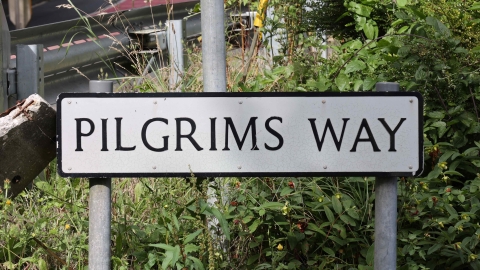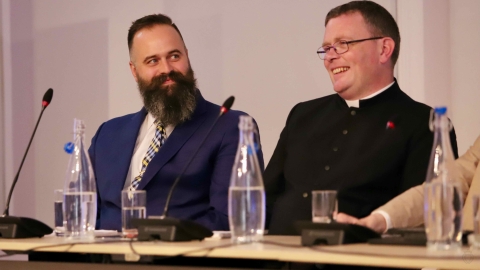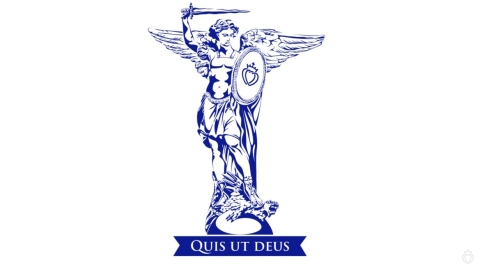Appeals ask Synod to reaffirm Church doctrine

From around the world, many petitions have been recently submitted to the Holy Father and the Synod Fathers requesting that the Church's doctrine on marriage and the family be clearly reaffirmed.
Image above: a view of some Polish bishops during an episcopal conference, who recently published an official statement in support of the Church's teaching on marriage.
From DICI #322, we offer this news summary about requests being sent to the Holy See by Catholics from around the world asking that the Church's teaching on marriage and the family be upheld.
In connection with this news, we also offer a new DICI video about the Synod on the Family: Indissolubility revisited.
The Synod: Many requests for a clear reminder of the Catholic doctrine on marriage and the family
Up until the eve of the synod’s opening, petitions and appeals in favor of the Catholic doctrine on marriage and the family addressed to the Holy Father and the synodal fathers poured in.
In the United States
On September 10, in the American journal First Things was published an international appeal written by professors David S. Crawford of Washington and Stephan Kampowski of the John Paul II Institute and signed by about 50 moralists and Catholic philosophers all over the world, including professors Robert Spaemann, Wolfgang Waldstein and Martin Rhonheimer, asking that the synodal fathers suppress paragraph 137 of the Instrumentum laboris, that goes against the teaching of the encyclical Humanae Vitae (July 25, 1968), leaving it up to the discretion of a spiritual director to find a compromise between the subjective conscience of the spouses entrusted to him and the objective moral norm of the Church.
It reads:
While paragraph 137 presents itself as an explanation of Humanae Vitae’s meaning, in fact it empties the encyclical of its central teaching. What is at stake here is not a minor detail, but a serious distortion of the basic content of Paul VI’s document. The inadequacies and misrepresentations contained in the Instrumentum laboris may have devastating consequences for the faithful, who are entitled to know the truth of the depositum fidei. Indeed, paragraph 137, if endorsed by the Synod, will sow seeds of confusion among the faithful. (…) Allowing the formulations of paragraph 137 to stand as part of the Synod’s teaching would imply that its logic could be applied to other areas in which the Church’s teaching concerning intrinsically evil acts is at stake, such as abortion or euthanasia.
We have been down this path before. The failure of theologians and even bishops and priests to give a robust endorsement to the teaching of Humanae Vitae has led to decades of weak allegiance to Church teaching, not only in sexual matters but across the board."
On September 15, a petition was addressed to the Holy Father by Bishop Bernard Fellay. Superior General of the Society of St. Pius X.
In Poland
On September 21, the Polish bishops (in the picture above) published their position on the family, which includes the following statements:
‘What God has united, let no man put asunder’, said Christ (Mark 10:9). Consequently, sacramental marriage is, by its very nature, indissoluble. God’s law sets limits that human decisions cannot transgress. Man does not have ‘full power over the divine, natural or human law’ (John Paul II, Speech to the Members of the Tribunal of the Roman Rota, Jan. 21, 2000). In a situation that is difficult for the spouses, the Catholic Church’s task is to help them deepen their love and their mutual responsibility and to help in their conversion. Today this type of pastoral care is more necessary than ever.
In the Catholic Church, there is no divorce and no process that leads to divorce. There is only the process in which it is individually determined whether or not the marriage was valid. Everyone must avoid the mentality of [resorting to] divorce. Any separation of the spouses is an offense against God that does great harm—not only leaving the spouses wounded, but also casting a painful shadow on their children, immediate family, friends and acquaintances—and destroys the basis of all society.
(…)
We hope that during the synod, an even greater recognition will be expressed towards the spouses who, generously and with wise deliberation have chosen to have many children, to give them life and take care of them, and to introduce them into the world of the Faith and of culture (Pontifical Council for the Family, Family and Procreation, 18-19). This recognition should also be extended to couples who adopt children and to persons who create family-type homes for children."
Along the same lines, Archbishop Stanislaw Gadecki, archbishop of Poznan and president of the Polish Bishops’ Conference, and Archbishop Henryk Hoser S.A.C., archbishop of Warsaw-Prague, released a document written by a group of Polish intellectuals who state:
We are deeply convinced that what the world needs today is the Christian teaching on the questions of marriage and the family. There is a serious temptation to dilute the definition of sacramental marriage and the family built on this foundation.
(…)
The Church cannot renounce her role of teaching and education even if it does provoke criticism. The Church’s silence on the redefinition of the conception of the family as seen today is often perceived as the sheep being abandoned by the shepherd. The Church has the responsibility to form the faithful who live in the contemporary world, but she must also present a legible, unambiguous teaching to those who live outside of the Church. In both cases, a theological, anthropological, moral and social reflection is needed—a reflection that will help to understand Revelation’s answers to the questions posed by the evolving world.
(…)
We hope that the upcoming synod will point out and call by their true name the ideas, institutions and mechanisms that lead to what Pope Francis calls the 'ideological colonization' of the contemporary world. Among the phenomena that require a comprehensive analysis and judgment are the school programs that deprive marriage of its spiritual and ethical dimension, the cultural and educational mechanisms of sexualization and perversion of children and the youth. The diktat of politics in the domains of anthropology and medicine, that aims at destabilizing sex and redefining the family, is a particular cause for worry."
In the world
On September 29, a Filial Appeal to His Holiness Pope Francis on the Future of the Family, signed by 790,901 persons, including 8 cardinals, was presented to the Secretary of State. The signatories asked the pope to say “the word” that will
clarify the widespread confusion arising from the possibility that a breach has been opened within the Church that would accept adultery—by permitting divorced and then civilly remarried Catholics to receive Holy Communion—and would virtually accept even homosexual unions when such practices are categorically condemned as being contrary to divine and natural law.
(…)
A word from Your Holiness is the only way to clarify the growing confusion amongst the faithful"
that has recently become so dramatically serious.
Among the signatories of the petition were:
- Cardinals Raymond Leo Burke, Patronus of the Order of Malta;
- Jorge Medina Estevez, Prefect Emeritus of the Congregation for the Divine Cult;
- Geraldo Majella Agnelo, Primate of Brazil and Secretary of the Congregation for the Divine Cult in Rome;
- Gaudencio Rosales, Archbishop Emeritus of Manila;
- Ricardo J. Vidal, Archbishop Emeritus of Cebu (Philippines);
- Janis Pujats, Archbishop Emeritus of Riga (Latvia);
- Alexandre Jose Maria dos Santos, O.F.M.,
- Archbishop Emeritus of Maputo (Mozambique).
In Rome
On September 28, three priests:
- Fr. Claude Barthe, a promoter of pilgrimages in support of the apostolic letter Summorum Pontificum,
- Msgr. Antonio Livi, doyen emeritus of the Faculty of Philosophy of the Pontifical Lateran University,
- and Fr. Alfredo Morselli, parish priest and retreat master,
published on Vatican specialist Sandro Magister‘s website Chiesa a document in which they declare that certain paragraphs of the final Relatio of the 2014 Synod, afterwards incorporated in the Lineamenta and the Instrumentum laboris,—concerning access to the Eucharist for divorced and then civilly remarried Catholics and homosexuals—contradict on some points the doctrine taught to all the faithful by the Church’s Magisterium, so much so that they “compromise the Truth” and render “inacceptable” the entire Instrumentum laboris, as well as “any other document that might reproduce its content and be submitted for vote at the end of the next synodal assembly.”
The three theologians criticize in particular paragraphs 122, 124-125 and 130-132 of the Instrumentum laboris, pointing out their shortcomings and silences. They state that:
Pastoral care is not the art of compromise and concession: it is the art of caring for souls in the truth. That is why all the synodal fathers must take into account the warning of the prophet Isaiah: ‘Woe to you that call evil good, and good evil; that put darkness for light, and light for darkness; that put bitter for sweet and sweet for bitter’ (Is. 5:20)."
On September 30, in Rome, during the international Congress Remaining in the Truth of Christ (Permanere nella verita di Cristo), organized by La Nuova Bussola Quotidiana,—in collaboration with L’Homme Nouveau for the French press—an Appeal to the synodal fathers was presented, requesting an integral proposition of the Catholic tradition on the problems of life, the family and education. Among others, the appeal was signed by 5 cardinals:
- Carlo Caffarra, Archbishop of Bologna;
- Raymond Leo Burke, Patronus of the Order of Malta;
- Walter Brandmuller, President Emeritus of the Pontifical Committee of Historical Sciences;
- Robert Sarah, Prefect of the Congregation for the Divine Cult;
- Joachim Meisner, Archbishop Emeritus of Cologne.
It reads:
The war against the family is not only cultural: it is also a social economic, juridical and doctrinal war, that even aims at the sacramental domain. So much so that a specific, strong and clear Magisterium is needed in its defense. A Magisterium that reaffirms the principles of natural law—that are not abolished but perfected by the Gospel—and that leads Catholics to the necessary defense of the family, that is their special role because of their responsibility for the common good of society and all those in it. It would be a grave mistake to accept the statutes that the forces dominating the world today (the dominant anti-Christian ideology, the aggressiveness of the more radical Protestant sects and the other religions) wish to impose upon the Church, restricting her to practices of devotion and good works, and considering it intolerable for her to claim to deliver a global proposition for the existence of man as such.
(…)
For this reason, dear synodal fathers, we beg you to make this synod pronounce a new proposition of the integral Catholic tradition on the problems of life, the family and education, in order to allow the Christian people today to deepen its proper identity and thus to fulfill its mission adequately.
(…)
It is particularly unthinkable for the Church to endorse an equivalence de facto, and even less de jure, between a relation between a heterosexual couple and a homosexual relation, since this would be a subversion of the natural law and of God the Creator’s plan of love."
In the light of all these petitions, Correspondence Europeenne put into words on October 4, under Giulio Ginnetti‘s pen, the question everyone is asking these days: “Are the synodal fathers and the Holy Father going to heed these appeals?”
(Sources: Correspondence Europeenne/chiesa—DICI no.322, 10-9-2015)




